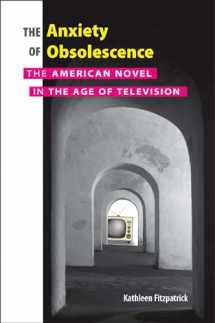
The Anxiety of Obsolescence: The American Novel in the Age of Television
ISBN-13:
9780826515193
ISBN-10:
0826515193
Author:
Kathleen Fitzpatrick
Publication date:
2006
Publisher:
Vanderbilt University Press
Format:
Hardcover
288 pages
FREE US shipping
Book details
ISBN-13:
9780826515193
ISBN-10:
0826515193
Author:
Kathleen Fitzpatrick
Publication date:
2006
Publisher:
Vanderbilt University Press
Format:
Hardcover
288 pages
Summary
The Anxiety of Obsolescence: The American Novel in the Age of Television (ISBN-13: 9780826515193 and ISBN-10: 0826515193), written by authors
Kathleen Fitzpatrick, was published by Vanderbilt University Press in 2006.
With an overall rating of 4.0 stars, it's a notable title among other
books. You can easily purchase or rent The Anxiety of Obsolescence: The American Novel in the Age of Television (Hardcover) from BooksRun,
along with many other new and used
books
and textbooks.
And, if you're looking to sell your copy, our current buyback offer is $0.35.
Description
It almost goes without saying that the rise in popularity of television has killed the audience for "serious" literature. This is such a given that reading Fitzpatrick's challenge to this notion can be very disconcerting, as she traces the ways in which a small cadre of writers of "serious" literature--DeLillo, Pynchon, and Franzen, for instance--have propagated this myth in order to set themselves up as the last bastions of good writing. Fitzpatrick first explores whether serious literature was ever as all-pervasive as critics of the television culture claim and then asks the obvious question: what, or who, exactly, are these guys defending good writing against?Fitzpatrick examines the ways in which the anxiety about the supposed death of the novel is built on a myth of the novel's past ubiquity and its present displacement by television. She explores the ways in which this myth plays out in and around contemporary fiction and how it serves as a kind of unacknowledged discourse about race, class, and gender. The declaration constructs a minority status for the "white male author" who needs protecting from television's largely female and increasingly non-white audience. The novel, then, is transformed from a primary means of communication into an ancient, almost forgotten, and thus, treasured form reserved for the well-educated and well-to-do, and the men who practice it are exalted as the practitioners of an almost lost art.Such positioning serves to further marginalize women writers and writers of color because it makes the novel, by definition, the preserve of the poor endangered white man. If the novel is only a product of a small group of white men, how can the contributions of women and writers of color be recognized? Instead, this positioning abandons women and people of color to television as a creative outlet, and in return, cedes television to them. Fitzpatrick argues that there's a level of unrecognized patronization in assuming that television serves no purpose but to provide dumb entertainment to bored women and others too stupid to understand novels. And, instead, she demonstrates the real positive effects of a televisual culture.


We would LOVE it if you could help us and other readers by reviewing the book
Book review

Congratulations! We have received your book review.
{user}
{createdAt}
by {truncated_author}


